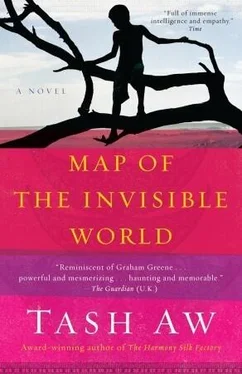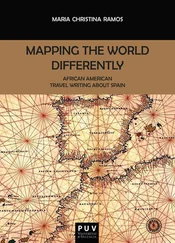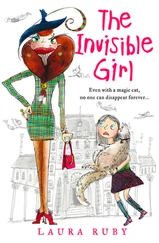Tash Aw - Map of the Invisible World
Здесь есть возможность читать онлайн «Tash Aw - Map of the Invisible World» — ознакомительный отрывок электронной книги совершенно бесплатно, а после прочтения отрывка купить полную версию. В некоторых случаях можно слушать аудио, скачать через торрент в формате fb2 и присутствует краткое содержание. Год выпуска: 2010, Издательство: Spiegel & Grau, Жанр: Современная проза, на английском языке. Описание произведения, (предисловие) а так же отзывы посетителей доступны на портале библиотеки ЛибКат.
- Название:Map of the Invisible World
- Автор:
- Издательство:Spiegel & Grau
- Жанр:
- Год:2010
- ISBN:нет данных
- Рейтинг книги:4 / 5. Голосов: 1
-
Избранное:Добавить в избранное
- Отзывы:
-
Ваша оценка:
- 80
- 1
- 2
- 3
- 4
- 5
Map of the Invisible World: краткое содержание, описание и аннотация
Предлагаем к чтению аннотацию, описание, краткое содержание или предисловие (зависит от того, что написал сам автор книги «Map of the Invisible World»). Если вы не нашли необходимую информацию о книге — напишите в комментариях, мы постараемся отыскать её.
comes an enthralling novel that evokes an exotic yet turbulent place and time—1960s Indonesia during President Sukarno’s drive to purge the country of its colonial past. A page-turning story,
follows the journeys of two brothers and an American woman who are indelibly marked by the past — and swept up in the tides of history.
Map of the Invisible World — читать онлайн ознакомительный отрывок
Ниже представлен текст книги, разбитый по страницам. Система сохранения места последней прочитанной страницы, позволяет с удобством читать онлайн бесплатно книгу «Map of the Invisible World», без необходимости каждый раз заново искать на чём Вы остановились. Поставьте закладку, и сможете в любой момент перейти на страницу, на которой закончили чтение.
Интервал:
Закладка:
“Sure,” Bill said. “Don’t worry, we won’t need it. It’s just … policy.” He held the gun firmly but quite calmly, and Margaret got the impression it was not the first time he had held one. She felt reassured, and hated herself for feeling reassured: Did she actually enjoy being protected by a man with a gun? It was his fault they were in this mess in the first place. No, no, no: It was hers. Today was just the latest episode in the bad comedy that was her life. She wondered if today would be the long overdue finale of this fine farce.
She had woken up very early that morning, with none of the dreadful lassitude of the previous days and weeks. The crick in her neck had disappeared; her shoulders were not stiff and her joints did not ache.
It had been a long time since she had appreciated twilight in Jakarta in this way: blue and mysterious, and full of murky promise. She remembered how she had felt when she first came here after the long years of winter in the States and Europe: lithe and unencumbered by the weight of woolen clothing. On the crossing from Rotterdam she had given away her winter clothes, article by article, to whoever would have them: Her serge overcoat was the first to go, just after Aden, donated gleefully to a Lebanese mother of five; three sweaters disposed of on the Indian Ocean to Indonesian crew members. When she arrived in Jakarta her suitcase was virtually empty. She bought some blouses made from thin cotton, cut in the local style, which reminded her of the clothes she had worn as a child: cheap, functional, and not very elegant.
It was this feeling that she had woken up with: a feeling of newness, of change, even though she did not know what that change would involve: the sensation of purity and possibility that she thought she had forgotten. The predawn air was fresh and gave her arms goose bumps as she stood in the yard drinking strong, muddy black coffee. She had dressed nicely, putting on a skirt (something she was now regretting) and a vaguely matching blouse. She checked her appearance in the mirror and, for a moment, even considered putting on some makeup, but the lipstick she salvaged from the back of a drawer was so old and neglected it had become as cracked as mud beds after a long drought. Never mind, she thought, brushing her hair: She looked absolutely fine; her eyes had even lost their recent puffiness. Before leaving she checked on Adam and found him in deep sleep, one hand raised to his brow, palm outward as if shielding his eyes from bright light. His head was turned slightly to one side as if avoiding an invisible sun and his jaw twitched every so often, but otherwise he lay perfectly still. The thin sheet had become entangled under his body, and Margaret gently extricated it before drawing it up to his chest. She left a note on the table in the kitchen that said simply, “Stay and Wait.”
On her way to meet Bill she had gone past groups of people performing their daily drills — star jumps, good-morning stretches, squats, thrusts, lunges, and arm blocks, feigning combat. A group of women marched briskly down the street, almost more quickly than the already heavy traffic. They were dressed in the standard uniform of volunteers — oversized khaki shirts, buttoned to the neck, and austere men’s trousers — and their heads were held high, chins lifted in defiance of the unseen enemy that was everywhere. It was always like this on Independence Day. Every other vehicle on the road seemed to be a public bus, commandeered to transport students and people from the outlying villages to the center of town so that they could hear the president’s address. Everyone else was left to negotiate the city on foot. There was a sudden explosion: mortar shells in the distance, and rifle shots and the piercing shrillness of whistles. A van nearby had broken down, its failing engine filling the air with thick smoke. Margaret lifted the collar of her shirt to cover her mouth and nose. Through the haze she saw figures making their way through the maze of cars. She knew she was not hallucinating: soldiers dressed in full army fatigue, crouching behind cars, their rifles trained on imaginary foes. One of them brushed past her becak , the twigs in his helmet rustling noisily, his radio crackling on and off as he stooped to avoid his mystery foe. She looked around her — people were watching with expressions of boredom; they knew these exercises would soon be over.
“What is it this time?” she shouted through the veil of her shirt.
Her driver laughed. “I think they’re trying to recapture the telephone exchange. But you know, if we were actually invaded I think we should teach our enemies a real lesson and give them the telephone exchange.”
Bill had just finished a meeting when Margaret arrived. He was standing in the shadow of a giant column in the shape of a crowbar crowned by a shaft of lightning.
“Come and have a look inside,” Bill said, taking her by the hand. “You’ll be amazed.”
Each of the floors of the building celebrated the vision of modern, independent Indonesia, Bill explained; each story was seventeen meters high (“Independence Day — today — August 17, geddit?”) , light and airy, made of polished concrete set in curves and angles. Everywhere Margaret looked she saw beautifully made models of highways, railways, waterways, hydroelectric dams, irrigation schemes, hospitals, factories, war planes, spaceships, nuclear plants, and luxurious hotels: entire worlds captured in glass cabinets. A modern port — quite unlike the ratinfested docks of Tanjong Priok — bustled with happy workers and angular, futuristic ships. In a Western-style living room, a smiling family sat on an orange sofa, pointing at a TV the size of a small cinema screen, their comfortable home filled with an array of electrical appliances Margaret could not identify. A bridge in the shape of a clover leaf — exactly the same as the one downtown — sat astride a network of streamlined highways, but the city around these roads was not the city Margaret knew. Here, in this other city that was Jakarta and yet not Jakarta, the famous clover-leaf bridge was surrounded by buildings of uniform modernity, and the people were well dressed and clean and healthy, carrying smart briefcases as they went to work. The cars were shiny and the roads tree-lined and clean, and there were children playing next to the canal, which did not look black and slimy like the one she knew. There were no slums in this city.
“Officially we’ve stopped all aid to Indonesia, and relations between our countries are at meltdown, but on a personal level nothing’s changed,” Bill said. He was wearing a light blue shirt, open at the neck to reveal strawberry blond chest hairs unfurling toward the base of his throat. His sleeves were rolled up to the elbow and he did not look as if he had been in the office. “My friends in town still want to see me — there’s still work to be done.”
“I like the way you see friends as work,” Margaret laughed. “Is there ever a moment when you let your guard down? I mean, do you ever not think of how everything fits into your master plan of world domination?”
Bill chuckled; she had forgotten how he looked when he laughed in this way, his cheeks shiny and blushed with red, almost cherubic and certainly unsophisticated. All of a sudden he was an Idaho farmer’s son once more. She could imagine him growing up on a prairie, sitting on the back of a tractor amid bales of hay. “Don’t tease me, Margaret Bates. You know I’m defenseless against your wit.”
“Oh, not quite that defenseless, particularly when there’s ‘still work to be done.’ Hmm, let me guess what kind of work that might be. Under-the-counter gifts of Rolex watches to your friends? A little Cartier necklace for the wife, perhaps? Or maybe just good old-fashioned cash …”
Читать дальшеИнтервал:
Закладка:
Похожие книги на «Map of the Invisible World»
Представляем Вашему вниманию похожие книги на «Map of the Invisible World» списком для выбора. Мы отобрали схожую по названию и смыслу литературу в надежде предоставить читателям больше вариантов отыскать новые, интересные, ещё непрочитанные произведения.
Обсуждение, отзывы о книге «Map of the Invisible World» и просто собственные мнения читателей. Оставьте ваши комментарии, напишите, что Вы думаете о произведении, его смысле или главных героях. Укажите что конкретно понравилось, а что нет, и почему Вы так считаете.












